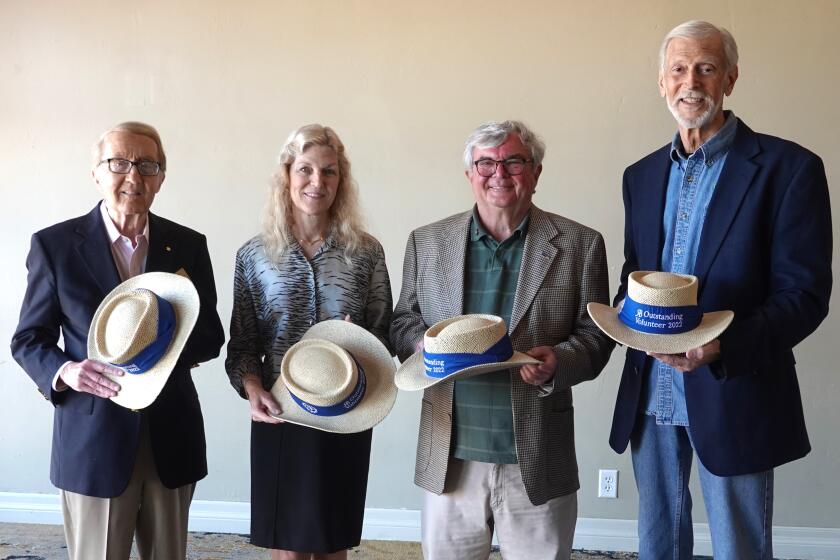Five candidates vying to be San Diego’s city attorney
There are five candidates in the June 7 primary vying to replace termed-out City Attorney Jan Goldsmith. If no one receives more than 50 percent of votes cast, the top two will advance to the November general election.
This is a non-partisan race. The candidates are:
Gil Cabrera, 44, is a Mission Hills resident who has lived in San Diego for 20 years. He earned his bachelor’s degree from California State University Fullerton and juris doctorate from Boston College School of Law. He is an attorney and small business owner who has never held political office. He is a Democrat. His campaign website is gilcabrera.com.
“I am the son of Cuban Chinese immigrants who came to this country with absolutely nothing and were able to live the American dream,” Cabrera said. “This instilled in me a deep sense of duty and desire to participate in public service. ... I’m running for city attorney because it brings two of my passions together: the practice of law and the opportunity to serve the people of America’s finest city.”
He said the three greatest issues impacting the city attorney’s office are:
• The current administration being “too political and often (giving) legal advice that is clouded by partisanship rather than direct knowledge of the law and what is best for the city,” he said, adding it has a lack of transparency that contributes to public distrust.
• A training and retention problem for the office’s attorneys that results in imperfect work. For example, “the office blowing the statute of limitations on dozens of cases, including domestic violence,” he said, and
• A lack of proper prioritization, which leads to departments with the ability to have the most direct impact on quality of life being underfunded and under staffed.
To address the issues he identified, Cabrera said he would:
• Only give legal advice with two considerations — what the law says and what is best for the city.
• Increase transparency to allow public officials, including himself, to be held accountable, and
• Recruit and train the best and most diverse legal minds to serve as staff, ensure cases are getting the quality attention they need, and prioritize and reform divisions of the office that most impact the people of San Diego.
He said the city attorney should have no role in political issues and both the city and citizens are the city attorney’s client. “Good legal advice will protect the city from lawsuits and protect taxpayers from shelling out money for settlements, legal fees and poorly negotiated contracts,” he said.
Rafael Castellanos, 41, is an East Village resident who has lived in San Diego for 10 years. He earned his bachelor’s degree from Arizona State University and juris doctorate from the University of Chicago Law School. He is an attorney who has also been a San Diego Port Commissioner since 2013. He is a Democrat. His campaign website is RafaelforSanDiego.com.
“I became an attorney to serve my community,” Castellanos said. “I have been immersed in San Diego in a number of civic organizations and as a port commissioner for many years and I continue to look for ways to give back to my community. As a means of continuing to give back I am seeking the office of city attorney.”
He said the three greatest issues impacting the city attorney’s office are:
• A lack of expertise and experience, which he said severely disadvantages the city when it comes to making good deals that benefit taxpayers.
• High deputy city attorney turnover and the subsequent cost of constantly hiring and training new attorneys, which impacts the city’s budget, and
• Its reactive instead of proactive approach to proposing solutions, facilitating the delivery of city services and accomplishing successful land use planning that promotes livable neighborhoods, economic development and environmental protection.
To address the issues he identified, Castellanos said he would:
• Bring his specialized legal and business expertise and experience in core areas that present the city’s major challenges and economic risk.
• Institute best management practices to advance proper deputy city attorney recruiting, training and retention, and
• Bring a true general counsel approach to the office and create a culture of responsiveness, excellence and always putting the public interest first.
He said the city attorney should have no role in political issues and the city attorney’s client is the city.
Mara Elliott, 47, is a Scripps Ranch resident who has lived in San Diego for 15 years. She earned her bachelor’s degree from UC Santa Barbara and juris doctorate from McGeorge School of Law. She is a chief deputy city attorney who has never held political office. She is a Democrat. Her campaign website is MaraElliott.com.
“I’m running for city attorney to get things done for our neighborhoods and protect taxpayers,” Elliott said. “As chief deputy city attorney I’ve delivered results: rooting out wasteful spending, holding polluters accountable (and) improving neighborhood services. I’m the only candidate ready to hit the ground running on day one to work for you.”
She said the three greatest issues impacting the city attorney’s office are:
• Aging infrastructure. Since nearly half of city streets and facilities are in poor condition, she said “we need to ensure our tax dollars are spent wisely on infrastructure needs.”
• Public safety since “there’s nothing more critical than keeping San Diego safe.” For example, she said there are more than 7,000 domestic violence incidents reported annually and it is the city attorney’s job to prosecute abusers and protect victims, and
• Jobs. While the city has seen strong job growth, most has been in low-wage industries. “We need to bring the high paying innovation jobs of tomorrow to San Diego,” she said.
To address the issues she identified, Elliott said she would:
• Regarding infrastructure, she said the city attorney’s office has a key role to play as a watchdog on audits to ensure tax dollars are spent wisely. It also advises the council on how to most effectively fund street repairs.
• Revive the Neighborhood Prosecutor Program so crimes in neighborhoods, like burglaries and domestic violence, “get the attention they deserve,” she said, and
• Create a business development center in the city attorney’s office that focuses on helping local businesses expand and attract new industries.
She said the city attorney should have no role in politics and the city attorney’s client is the city, “but ultimate accountability rests with the voters.” Elliott added, “I’d always advise what’s best for the city, but I’d never lose sight of the fact that I work for you. I won’t hesitate to tell the politicians no and I’ll speak out when it’s necessary.”
Robert Hickey, 47, is a Point Loma resident who has lived in San Diego for 39 years. The Poway High graduate earned his bachelor’s degree from UC San Diego and juris doctorate from the University of San Diego Law School. He is a deputy district attorney who has never held political office. He is a Republican. His campaign website is HickeyforCityAttorney.com.
“I believe San Diego is at a crossroads. We (have) come too far up from too far down to risk a setback now,” Hickey said. “The wrong city attorney could quickly return San Diego to the chaos of the past. ... I’m the only candidate with extensive experience leading large teams of attorneys on complex cases, as a manager in the gangs and major narcotics units, as elected president of the Deputy District Attorneys Association and during my time in private practice.”
He said the three greatest issues impacting the city attorney’s office are:
• The city attorney needing to provide strong leadership to the team; deputy city attorneys needing to receive clear direction and guidance, then empowerment to do their job; and a need to build a stronger mindset of service in the office.
• Since Proposition 47 made former felony crimes now misdemeanors, creating an expected 15 percent increase in criminal cases, he said the city attorney needs a strong criminal prosecution background, and
• The city attorney’s review of all proposed ordinances and development projects must occur quickly and accurately so there are no delays that increase the cost of doing business or housing construction.
To address the issues he identified, Hickey said he would:
• Ensure he has a well organized team of experts working towards a common vision of swift, accurate service.
• Carefully evaluate the criminal division and make changes to improve the city’s response to domestic violence, plus work toward improving the lives of the chronically homeless instead of incarcerating “our way out of this problem,” he said, and
• Provide a consistent city response to obstructionist lawsuits and build trust with other departments and public so deputy city attorneys can participate in the planning process earlier in order to reduce litigation risk and unnecessary delays.
He said the city attorney should not get involved in political issues, only give prompt and accurate legal advice. Hickey said the city attorney should represent the people in criminal matters, and on civil matters represent the city and work with those elected.
Bryan Pease, 38, is a University Heights resident who has lived in San Diego for 12 years. He earned his bachelor’s degree from Cornell University and his juris doctorate from State University of New York at Buffalo Law School. He is an attorney who has never held political office, but was a candidate for the San Diego City Council’s District 1 seat in 2012. He is a Democrat. His campaign website is BryanPease.com.
“I have been leading a public interest law practice in San Diego for over 10 years, and my job is to hold government agencies and big corporations accountable,” Pease said. “I love this work and could do it more effectively and on a system-wide basis as city attorney.”
He said the three greatest issues impacting the city attorney’s office are:
• Disproportionate impact of misdemeanor prosecutions on the poor, while corporations get a free pass.
• Improper use of prosecutorial resources that make homelessness worse, and
• Lack of emphasis on consumer and environmental protection, and freedom of speech and assembly.
To address the issues he identified, Pease said he would:
• Bring back community courts, eliminate bail for nonviolent offenses and streamline the system so people can get back on track and victims are not left out of the process.
• Eliminate fines for illegal lodging and sleeping in cars. He would instead offer people the resources they need, and
• Expand the consumer and environmental protection units and stop prosecuting people for free speech.
He said the city attorney should not play a role in political issues “other than to ensure greater transparency and accountability of government.” When asked who is the city attorney’s client, Pease said “citizens first always.





